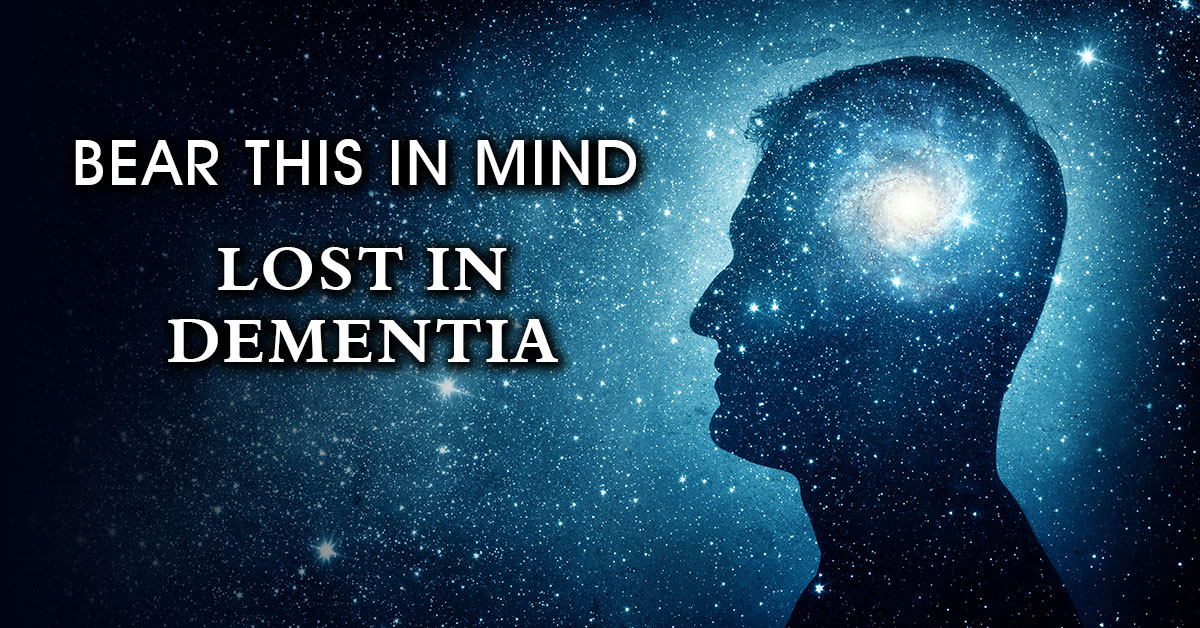BEAR THIS IN MIND – LOST IN DEMENTIA

Memory problems are usually the most obvious symptom in people with dementia. Forgetfulness is common. As a rule, the most recent events are the first forgotten. Events of the past are often remembered until the dementia is severe. As the disease progresses, the person may actually think they may be living in the past. They may have difficulty remembering names or finding words. They may appear to be asking questions all the time. Often the same ones. They can have trouble understanding what is said to them or understanding written information. Losing track of time is common, with them not knowing if it is morning, afternoon or evening. They can get lost easily and eventually not even be able to take care of their personal hygiene. They can forget to change their clothes, take their pills, shop, cook and even eat. They need a lot of help just to get through each day.
NOT JUST ABSENT MINDED, MIND ABSENT
Alzheimer’s is the most common, severe, and debilitating form of dementia, and what is most surprising is that it is not a normal part of aging. Up to 5 percent of people with the disease have early onset Alzheimer’s (also known as younger-onset), which often appears when someone is in their 40s or 50s. Alzheimer’s is a progressive disease, where dementia symptoms gradually worsen over a number of years. There is no cure for Alzheimer’s, and for someone who knows someone with the disease, it is like losing them, even while they are still alive. It’s devastating. What’s not common knowledge is that it is the 6th leading cause of death in the United States. The facts are staggering:
- Someone in the United States develops Alzheimer’s every 66 seconds
- More than 5 million Americans live with it
- More than 13 million are projected to have it by 2050
BRAIN DRAIN
Beyond the disorders we’ve discussed, The National Institute of Neurological Disorders and Strokes has estimated that more than 400 illnesses are caused by the brain. Below is just a partial list:
- LUPUS
- FIBROMYALGIA
- LOW THROID
- PARKINSONS
- PMS
- STROKES
- MENINGITIS
- HUNTINGTON’S DISEASE
- BELL’S PALSEY
- DYSLEXIA
- NARCOLEPY
- TJOURETTE SYNDROM
- SHINGLES
- EPILEPSY
- TUMORS
- ENCEPHALITIS
- ANEURYSM
- EPIDURAL HEMATOMA
- MULTIPLE SCLEROSIS MS
- ALS (LOU GEHRIG’S DISEASE
- AUTISM
Consider yourself fortunate if you only get headaches.
DRAWING A BLANK?
What do you think of when you hear someone has “brain chemistry” health problems? Usually the answers are dire. But often, hormones are the cause for frightening symptoms like emotional distress, mood swings, depression, anxiety, irritability, extreme fatigue, and yes, even memory. Achieving hormone balance can often restore normality to these issues, offering relief instead of progressively worsening symptoms. And progressively worsening fear. With hormones, it’s all about balance. They can’t be too high, or too low. They have to be just right. Otherwise these imbalances can cause myriad health issues, including mental ones. It’s something you never want to forget. Which is why you should see Stephen A. Goldstein, M.D, F.A.C.S. at Denver Hormone Health. Few other experts in the Denver area have the advanced knowledge, expertise and experience he does in treating hormone-related problems. And few others care as deeply as he does in allaying your fears and giving you answers. Keep in mind that his one goal is to make his patients feel their very best. With simple tests, he’ll be able to tell how hormones are effecting how you feel, and create a uniquely dynamic, individual strategy to make you feel better, and think straighter. So, call now.
I’ll be a load off your mind.
